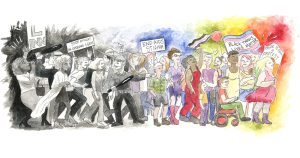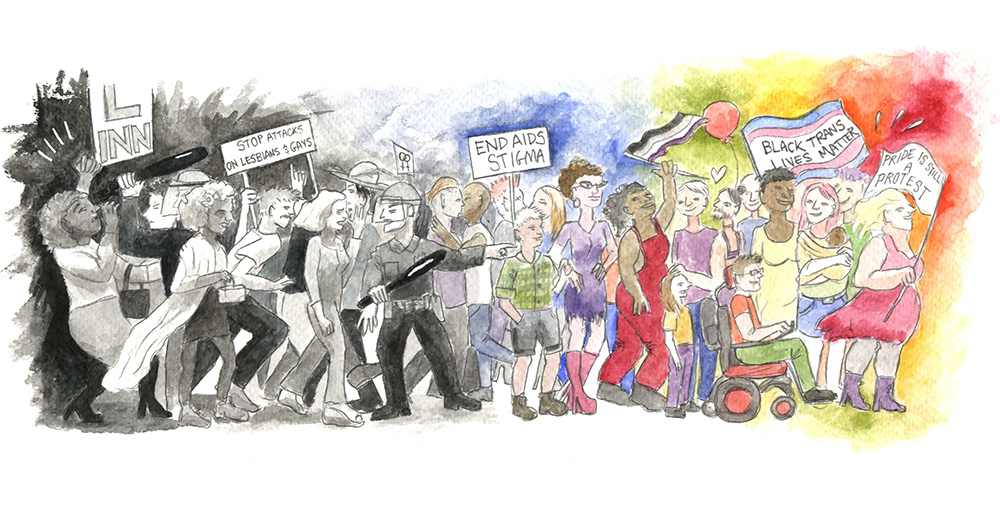GCNnewvoices in partnership with BeLonG To platforms the opinions and thoughts of LGBTQ+ young writers from across the country, speaking about issues that matter to them. Aoibhín speaks about the importance of Pride Parades.
“Why do we still need Pride?” – a question that I’ve heard being echoed by many people.
“They have all their rights!” Do we? And yet conversion therapy is still legal in the Republic of Ireland, even though same-sex marriage was legalised over six years ago.
Have you heard someone say: “why do they need an entire month for Pride?” Well, the historical event of the Stonewall riots deserves to be honoured. Undoubtedly, Pride Parades are an essential part of life for many LGBTQ+ people. And after the years we’ve had, I believe it’s even more important now than ever.
So what exactly is Pride? By definition: LGBTQ+ Pride is the promotion of the self-affirmation, dignity, equality, and increased visibility of LGBTQ+ people as a social group. Everyone needs some level of pride to be confident and self-accepting of themselves. Therefore to promote equality, in the month of June every year, thousands of people march at their local Pride Parades. By wearing rainbows and waving Pride flags, they brighten up the streets. Personally, it just feels so empowering to be walking with a strong community of people who have all undergone the same struggle for justice and impartiality.
However these celebrations were abruptly cancelled in light of the Covid-19 pandemic. Parades could no longer take place and many annual Pride events moved online. The impact of these was so clearly seen by the LGBTI+ Life in Lockdown One Year Later survey conducted by BeLonG To.

LGBTQ+ youth groups could no longer run in-person, which resulted in less support for the youth. According to the survey: 97% of LGBTQ+ youth struggle with anxiety, stress or depression.
In my opinion, having no Pride Parades meant that LGBTQ+ youth, especially those who lived in non-accepting households, saw their mental health greatly impacted. To back up, the survey also states how 83% of young people felt loneliness throughout the pandemic. It has been made evident that Pride Parades are crucial for a feeling of inclusion and the mental health of the queer community.
Specifically to Ireland, anti-LGBTQ+ acts made the news headlines during Pride month earlier this year. One example is the burning of Pride flags in Waterford when flags just outside the Menapia Building were taken down and burned overnight. This malicious act conveys how the LGBTQ+ community remains a target and that the constant fight against discrimination is far from over.
Another example is Pantibar in Dublin – homophobic graffiti was spray-painted onto a nearby building. Even specifically queer-friendly spaces are being seen as places to victimise the minority. This is why Pride Parades are needed to make a visual statement to other people of how we are proud and unapologetically ourselves. Afterall, there is strength in numbers.
Without a doubt, the Covid-19 pandemic had a severe impact on the queer community in terms of isolation, alienation and marginalisation. Pride Parades are needed to combat the hate and ignorance of other people in the form of bright colours in large crowds. Hopefully, next year we can look forward to celebrations and gatherings yet again to honour our Pride.
“Courage is being yourself everyday in a world that tells you to be someone else.”
© 2021 GCN (Gay Community News). All rights reserved.
Support GCN
GCN is a free, vital resource for Ireland’s LGBTQ+ community since 1988.
GCN is a trading name of National LGBT Federation CLG, a registered charity - Charity Number: 20034580.
GCN relies on the generous support of the community and allies to sustain the crucial work that we do. Producing GCN is costly, and, in an industry which has been hugely impacted by rising costs, we need your support to help sustain and grow this vital resource.
Supporting GCN for as little as €1.99 per month will help us continue our work as Ireland’s free, independent LGBTQ+ media.
